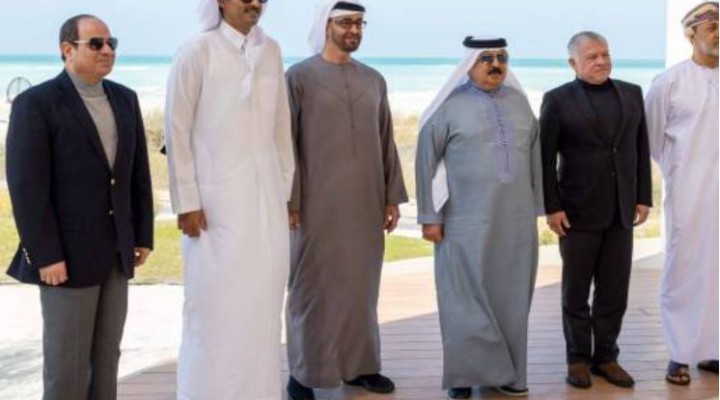What was the Abu Dhabi mini-summit about?

Rescuing Egypt? Supporting Jordan? Avoiding war with Iran? Or none of the above?
On Wednesday, the UAE hosted a hastily convened consultative mini-summit in its capital Abu Dhabi. It brought together the leaders of four Gulf Cooperation Council (GCC) countries (Oman, Qatar, Oman, and UAE) with Egyptian President Abdelfattah as-Sisi and Jordan’s King Abdullah II. Conspicuously absent were Saudi Arabia’s de facto ruler Muhammad Bin-Salman and the emir of Kuwait or his deputy. No explanation has yet been provided for their non-attendance, either officially or through leaks to the media.
This surprise gathering was arranged at very short notice. On Tuesday, Sisi, Abdullah, and Palestinian President Mahmoud Abbas had met in Cairo, after which the Jordanian monarch jetted to Abu Dhabi with a message for its ruler Sheikh Muhammad Bin-Zayed, prompting him to call for this consultative mini-summit to be convened immediately.
Some very pressing issue must have caused him to act. For example:
(1) Egypt’s criticaland worsening financial and economic condition, and the draconian remedies prescribed by the IMF (reportedly including a massive injection of Gulf petrodollars) to avert a total collapse.
(2) Growing concerns about Benjamin Netanyahu’s new ultra-right Israeli government and its plans, including the takeover of the al-Aqsa Mosque and its Hashemite custodianship, the annexation of the West Bank, and the transfer of hundreds of thousands of its inhabitants to Jordan.
(3) Fears about an impending US-Israeli attack on Iran — as warned of recently by former Qatari PM Hamad Bin-Jassim — and the disastrous consequences that would have for the Gulf states.
I suspect the economic collapse threatening Egypt was the most urgent item on the agenda. Gulf aid has been completely halted, and any continuing cash inflows are no longer in the form of non-repayable grants or unconditional deposits. Top officials from both sides have confirmed that.
The absence of the emir of Kuwait from the summit may be understandable. It has been engaged in a succession of rows with Egypt, including over the expulsion of Egyptian workers from Kuwait and calls by members of its National Assembly — whose relations with the government are in crisis — for a halt to all aid to the country.
But the absence of the Saudi crown prince is harder to explain.
Relations between the GCC states are not in great shape. The all-smiles reception laid on byMBZ to the emir of Qatar, Sheikh Tamim, may have raised hopes about the easing of tensions between the two sides. But tensions have reportedly been rising between the UAE and Saudi Arabia over the Yemen war and other issues. The apparent UAE-Qatar rapprochement may be a mere by-product of that.
Relations between Saudi Arabia and Egypt are also worse than they have been for years. There are reports that Egypt has been dragging its feet over the transfer of its Red Sea islands of Tiran and Sanafir to Saudi sovereignty. And Egyptian media have been up in arms against the Saudi-owed channel MBC and its coverage of Egypt.
The Palestine Question is unlikely to have been a priorityat the Abu Dhabi summit, given that Abbas (who is subject to a UAE veto) wasn’t invited. But serious consideration may have been given to the concerns of Jordan, which is under heavy US pressure to attend the second iteration of the so-called Negev Summit in Morocco. King Abdullah may have urged the Gulf states that have normalised relations with Israel to use their influence to decrease that pressure because of the destabilising domestic repercussions it could have in Jordan.
All the states attending the Abu Dhabi summit bar Oman and Qatar have signed official normalisation agreements with Israel. The absentees, Saudi Arabia and Kuwait, have not — or at least not yet. Is that a coincidence or was it deliberate?
The mini-summit lasted only a few hours. Will it ease inter-Arab and inter-Gulf disputes or complicate them further? And will it reopen the taps for billions of Gulf dollars to gush into Egypt or will thing remain as they are? We can only wait and see.
https://www.raialyoum.com/what-was-the-abu-dhabi-mini-summit-about/
 TheAltWorld
TheAltWorld 
0 thoughts on “What was the Abu Dhabi mini-summit about?”